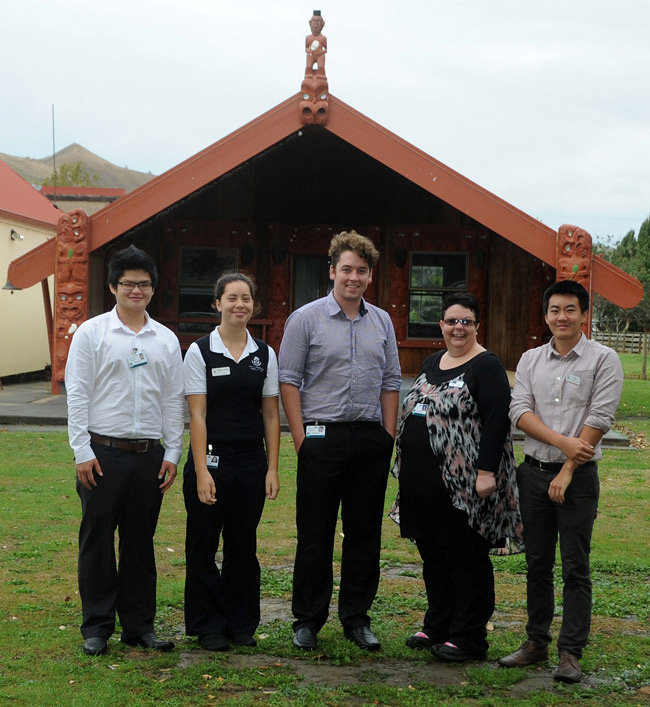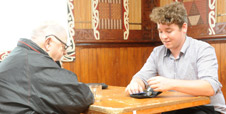
On the Muriwai Marae are Aaron Lim (Pharmacy), Rasella-Joy (RJ) Faleastua (Physiotherapy), Gray Barnett (Pharmacy), Samantha Cotton (Nursing) and Thomas Chung (Dietetics).
A new study shows an interprofessional rural health programme the University runs on the East Coast near Gisborne is highly successful for students, patients and the local community.
Research into the project — which involves students from a range of health professions working together in the community — demonstrates the enormous strengths and benefits of the Tairāwhiti Interprofessional Education (TIPE) programme.
By the end of this year, 312 final year students from eight health professions will have come together in successive five-week rotations to do the programme.
The students live together at Gisborne Hospital or Wairoa Hospital during an experience that not only involves learning from their clinical tutors and programme leaders, but also from each other.
Aims of the programme
The aims of the programme — which has been operating for almost five years — include helping students to work in Māori health, collaborate in interprofessional teams, advocate for patients' involvement in any decision-making, and understand the rural health environment.
Programme Director and study leader, Associate Professor Sue Pullon, says the study's findings are critically important because they show rurally-based inter-professional education in New Zealand can successfully meet multiple objectives within five-weeks — more so than traditional education within each individual profession.
“Dental, dietetic, medical, nursing, pharmacy and physiotherapy students together gain rich practical experience working closely with Māori patients and whānau, and contribute to the community with their education projects.”
Occupational Therapy and Oral Health students have also joined the programme relatively recently.

Pharmacy student Gray Barnett talks to Type 2 diabetes patient Malcolm Dobson at Muriwai Marae about changes to his glucose meter.
Results
For the study, the students were surveyed both before and after taking part in the programme. Then, they were compared to a group of classmates who did not attend.
The programme students were significantly better at working well with each other, understanding rural health and Hauora Māori (a unique philosophy of health and wellbeing), and were more confident in caring for people with long-term conditions.
“These senior health professional students not only enjoy their experiences in the TIPE programme, but also learn practical skills for working in health care teams in rural New Zealand,” Dr Pullon says.
“In today's health care world, learning to practise collaboratively and work in a wide variety of health care settings are essential clinical skills, and this programme equips senior students to transition successfully to their new health practitioner roles.”
Interns
Dr Patrick McHugh says he is delighted to see an increasing number of TIPE graduates return to the region to work in intern positions or permanent roles.
Dr McHugh is an academic TIPE leader, a co-author of the study, and a long-time champion for the rural health workforce.
The programme is run by the University of Otago, the Eastern Institute of Technology, Hauora Tairāwhiti District Health Board (DHB) and the Hawkes Bay DHB, in conjunction with its Whakatane-based counterpart (University of Auckland, Bay of Plenty DHB).
Funding for the programme has come from Health Workforce New Zealand.
The study of the programme has just been published in BMC Medical Education: Link to study.
More information about the TIPE programme